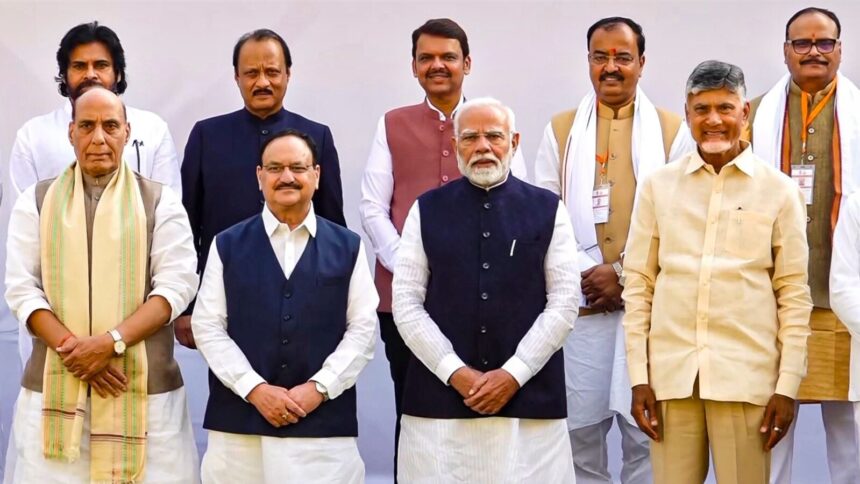Upcoming NDA Meeting: Key Issues and Implications for Indian Politics
On December 25, a significant meeting of the National Democratic Alliance (NDA) is set to take place in Delhi, which is expected to address pressing matters that could shape the landscape of Indian politics in the near future. This gathering will be attended by top leaders of the NDA at the residence of Bharatiya Janata Party (BJP) President JP Nadda, beginning at 4 PM. The agenda is primarily focused on two critical issues: the recent controversies surrounding remarks made by Union Home Minister Amit Shah concerning Dr. Bhimrao Ambedkar, and the need for enhanced coordination among NDA allies as they gear up for upcoming electoral challenges.
The Ambedkar Controversy
One of the most contentious topics that will be discussed is Amit Shah’s statement regarding Dr. Bhimrao Ambedkar, which has drawn significant backlash from opposition parties, particularly the Congress. During the recently concluded Winter Session of Parliament, the Minister’s comments implying that the frequent invocation of Ambedkar’s name has become a "fashion" sparked widespread protests and demands for his resignation. His original statement hinted that if the opposition had praised God with the same fervor, they would have achieved spiritual elevation. This remark is seen as an insult to the legacy of Ambedkar, a revered figure in Indian history and a symbol of social justice.
In response, the opposition has united to challenge Shah’s remarks, which they argue trivialize Ambedkar’s contributions to Indian society. The Congress party has been vocal in its condemnation, with party leaders actively calling for accountability and respect towards Ambedkar’s legacy. Given the gravity of this situation, the NDA allies are expected to strategize on how to collectively respond to the criticism and ensure that they maintain their stance in the face of mounting pressure from the opposition.
Coordination Among NDA Allies
Another significant agenda for the meeting will be enhancing cooperation among NDA allies. Reports indicate that BJP leaders are advocating for more regular meetings among alliance partners to foster unity and streamline their efforts, particularly as they prepare for the Delhi Assembly elections in 2025. This is especially pertinent given the internal dynamics that have emerged within the alliance, where parties such as the Janata Dal (United) led by Nitish Kumar and Lok Janshakti Party (LJP) are seeking clarity on their roles and potential seat allocations in upcoming elections.
Intensified coordination among allies will not only help consolidate the NDA’s position in Delhi but also determine the success of the alliance in countering the opposition narrative and bolstering their collective electoral strategy.
Upcoming Legislative Discussions
In addition to the Ambedkar controversy and seat-sharing strategies, the NDA leaders are likely to discuss key legislative issues, including the Waqf (Amendment) Bill for 2024, which has been put forward for wider scrutiny by the Joint Parliamentary Panel. Addressing legislative initiatives in a united front may help the NDA demonstrate its commitment to governance and reform, potentially offsetting negative perceptions arising from the ongoing controversies.
Implications for Political Dynamics
The meeting holds significant implications for the future of the NDA as the political climate in India becomes increasingly contentious. With the backdrop of the recent protests in Parliament and the growing scrutiny of government statements, the NDA’s ability to manage internal differences and navigate external pressures will be crucial.
Additionally, the gathering coincides with the 100th birth anniversary of a major BJP stalwart, which imbues the meeting with symbolic importance. Leaders may seek to channel the legacy of the party’s historical figures to formulate strategies that resonate with their base and reaffirm their commitment to the foundational ideals of the party and the alliance.
As the political landscape evolves, the outcomes of this meeting could serve as a bellwether for the NDA’s strategy moving forward, impacting not just the upcoming elections but the broader political discourse in India.
Conclusion
In summary, the December 25 meeting of the NDA is poised to be a pivotal event as it grapples with controversies, internal coordination, and legislative priorities. The leaders will need to strike a balance between addressing dissent and presenting a unified front, which will be essential as they navigate the complexities of Indian politics in the lead-up to crucial electoral battles. As public sentiment continues to evolve, the effectiveness of their strategies will ultimately determine their political fortunes in the coming years.










